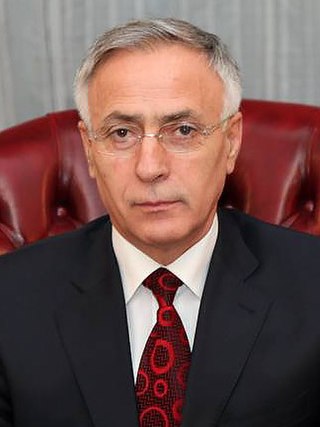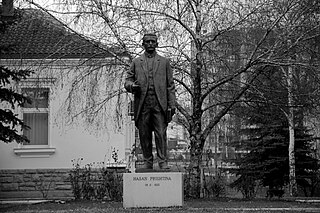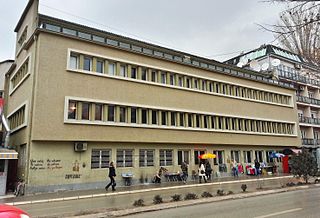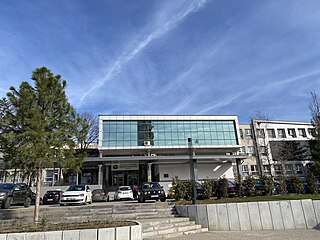Related Research Articles

Mehdi Bardhi was a Kosovar linguist, author, and teacher.

Jakup Krasniqi is a Kosovo-Albanian politician and former acting president of Kosovo. He is former chairman of the Assembly of Kosovo. In 2020, he was indicted for war crimes and crimes against humanity during the Kosovo War.

Education in Pristina, the capital of Kosovo, consists of primary, secondary and higher education. Pristina houses a number of public and private institutions, such as the University "Hasan Prishtina", the National Library of Kosovo, and the Academy of Sciences and Arts of Kosovo. Throughout the last century Pristina has attracted a considerable number of students from Kosovo. Today, the city of Pristina hosts a large number of intellectuals, professors, academics, students, and professionals in various spheres.

The Faculty of Arts of Pristina is the faculty of arts of the University of Pristina, located in Pristina, Kosovo.
Jashar Rexhepagiq was a Yugoslav Albanian and Kosovar scholar and writer. Jashar Rexhepagiq was born in Plav in Montenegro and went to school in Berane and Peja. He studied education at the University of Zagreb where he finished his doctorate in 1965. Rexhepagiq taught school in Prizren and later as a professor of education taught at the University of Prishtina until 1990. He was an active member of the Academy of Sciences and Arts of Kosova until his retirement from public life.

The National Institute of Public Health of Kosova (NIPHK) is the oldest and highest health, professional and scientific institution of Kosovo, which organizes, develops, supervises and implements public health policies in Kosovo. The NIPHK covers the entire territory of the Republic of Kosovo through its branches - Public Health Institutes (IPH) organized in these Regional Centers: Peja, Prizren, Mitrovica, Gjilan, Gjakova, Ferizaj.
Pajazit Nushi was a university professor, psychologist and scientific and social-political worker from Gjakova, Kosova. Member of the Academy of Sciences and Arts of Kosovo.
Shefik Osmani was an Albanian pedagogist, scholar, researcher, and educational theorist.

The Faculty of Philology is an academic unit within the University of Pristina. Established in 1988 after gaining independence from the Faculty of Philosophy, its roots can be traced back to the Higher Pedagogical School of Pristina (1958) and the Faculty of Philosophy (1960).
Xheladin Murati is an educator, university professor, and former deputy in the Parliament of North Macedonia.
Islam Krasniqi is a Kosovan didactician, educational theorist, and university professor.
Musa Kraja was a notable figure in Albanian education. He was an educator, doctor of pedagogical sciences, university professor, and an author of pedagogical works and biographical monographs. His contributions were recognized with the title of "Distinguished Teacher".

The University of Gjakova "Fehmi Agani" - UGJFA is a public university located in Gjakova, Kosovo. It was originally established as a Higher Pedagogical School in 1967 and has since grown into a comprehensive university.

The University Clinical Center of Kosovo is the largest and most prominent medical institution in Kosovo, located in Pristina, the capital city. The UCCK provides a wide range of medical services, including specialized treatments and surgeries, and plays a crucial role in healthcare delivery and medical education within Kosovo.
Hajrullah Koliqi (1946) is an Albanian educator, lecturer and university professor from Montenegro.
Remzi Nesimi (1933–2018) was an Albanian linguist, professor, and researcher from North Macedonia. Nesimi's dedication to the Albanian language and education left a lasting mark, and he is remembered as a respected scholar and mentor.
Afërdita Deva-Zuna is a university professor, researcher in the field of family pedagogy, and author of pedagogical works and studies. She made significant contributions to the development of pedagogical thought in Kosovo.
Nexhip Alpan (1920–2003), also known as Necip Alpan in Turkish, was a multifaceted figure who made contributions in various fields, including Albanology, pedagogy, educational activities, journalism, and science.

Wilfried Fiedler was a German albanologist, balkanologist, and linguist, known for his significant contributions to the studies of the Albanian language and Balkanology.
The Pedagogical Institute of Kosovo (PIK) is a professional research and educational institution established in 2007, with its headquarters in Pristina. PIK plays a crucial role in the development and improvement of the educational system in Kosovo, focusing on enhancing the quality of education through teacher training, curriculum development, and educational research.
References
- ↑ Bicaj, Arberore; Berisha, Fatlume (2013). "Teacher preparation reforms in Kosovo". Journal of Education Culture and Society. 4 (1): 199–208. doi: 10.15503/jecs20131.199.208 . ISSN 2081-1640.
- ↑ Kraja, Mehmet, ed. (2018). "Fjalori Enciklopedik i Kosovës". Encyclopedic Dictionary of Kosova (in Albanian). Vol. 2. Pristina: Kosova Academy of Sciences and Arts. pp. 1593–1594. ISBN 9789951615846. OCLC 1080379844.
- ↑ Lafe, Emil, ed. (2008). "Fjalor Enciklopedik Shqiptar". (Encyclopedic Dictionary of Albania) (in Albanian). Vol. 3. Tirana: Academy of Sciences of Albania. pp. 2486–2487. ISBN 9789995610272. OCLC 426069353.
- ↑ Koliqi, Hajrullah (2022). Fjalor enciklopedik i edukimit [Encyclopedic Dictionary of Education] (in Albanian). Vol. 2. University of Pristina. p. 1489-1490. ISBN 978-9951-00-320-9.
- ↑ "Normalja e Gjakovës, themel i arsimit shqip në Kosovë - Zëri". 2019-05-18. Archived from the original on 2019-05-18. Retrieved 2024-07-12.
- ↑ Vokrri, Abdulla R. (2004). Shkolla normale e Prishtinës: (1953 - 1974) [Prishtina Normal School (1953-1974)] (in Albanian). Shtëpia Botuese Libri Shkollor. ISBN 978-9951-07-223-6.
- ↑ Elsie, Robert (2004). Historical dictionary of Kosova. Internet Archive. Lanham, Md. : Scarecrow Press. p. 250. ISBN 978-0-8108-5309-6.
- ↑ "Pajazit Nushi". Oral History Kosovo. Retrieved 2024-07-12.
- ↑ "University of Prishtina (1970-2005)". 2016-07-25. Archived from the original on 2016-07-25. Retrieved 2024-07-12.
- ↑ Muçiqi, Ismail. "Normalja e Prishtinës bazament i arsimit shqiptar" [The Prishtina Normal School, the foundation of Albanian education]. Bota Sot. Retrieved 2024-07-12.